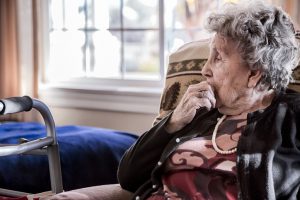
Serious illness can be overwhelming for patients, families, and friends. There are so many critical decisions at each step of the way!
 What treatment path should we follow?
What treatment path should we follow?Who will guide us on how effective that choice may be – and at what cost of side effects and quality of life?
How do we know when’s the right time to consider the extra layer of support that hospice can provide when an illness continues to advance despite the most aggressive treatments?
{Scroll down} The following overview on eligibility for hospice care can help – and our nurses are always available to answer your personal questions to help make your transitions less stressful.
 Samaritan is a member of the National Partnership for Healthcare and Hospice Innovation, a network of not-for-profit hospice and palliative providers across the country. If you know someone outside of our service area who is living with advanced illness and can benefit from hospice or palliative care, please call 1 (844)-GET-NPHI (844-438-6744) for a referral to a not-for-profit provider in your area.
Samaritan is a member of the National Partnership for Healthcare and Hospice Innovation, a network of not-for-profit hospice and palliative providers across the country. If you know someone outside of our service area who is living with advanced illness and can benefit from hospice or palliative care, please call 1 (844)-GET-NPHI (844-438-6744) for a referral to a not-for-profit provider in your area.
Eligibility by Disease: Cancer | Heart Disease | Dementia | For Healthcare Professionals
| Referral Form | Additional Resources | Inpatient Hospice Criteria
The comforting care of Samaritan is open to people of all age groups, including children, who live within Atlantic, Burlington, Camden, Gloucester, or Mercer counties. The eligibility criteria for hospice care :

In addition to the above hospice eligibility criteria, many hospice-eligible patients have had frequent hospitalizations and/or emergency room visits over the last 6 months related to their serious illness.
General Signs & Symptoms

*Samaritan’s goal is to care for you and your family if you have a life-limiting illness and are seeking comfort care. The type of life-limiting illness does not matter.

Now is the best time to learn more. Although end-of-life care may be difficult to discuss, it’s best for family members to share their wishes long before it becomes a concern.
Hospice care isn’t giving up. It’s ensuring that your loved one or patient is as comfortable as possible during the time he or she has left.

The general hospice eligibility criteria above apply to any illness or diagnosis. But many patients and families wonder how these general criteria apply to their specific illness. Let’s explore hospice eligibility criteria if you or someone you care for is living with advanced cancer, heart disease, or dementia. There are also specific criteria available on our site for ALS, HIV, Kidney Disease, Lung Disease, and Stroke.
Note: Not every eligible patient will have every disease “trigger” for hospice care. When in doubt, please call our Access Center at (856) 596-1600 to discuss your specific needs or questions. You may also request to arrange a visit to see if you meet the eligibility for hospice care, or for other services such as palliative care.

People living with advanced cancer may be eligible for palliative care from the time of diagnosis to relieve their pain and anxiety, and control other symptoms. Palliative care is available at the same time patients are receiving curative treatments. Our staff will work with patients’ family physicians or specialists to “connect the dots” for their best quality of life.
Patients become eligible for hospice care if they meet one or more of the following criteria:

According to the National Institutes of Health, an estimated 6 million people are living with the advanced heart disease known as congestive heart failure (CHF). Almost 700,000 people are diagnosed with the disease each year.
In CHF, the heart wears down and becomes less able to pump blood in to receive oxygen and out to deliver that oxygen throughout the body. When this pump is not working well, every body system is affected.
Living with advanced heart disease can be a daily challenge for patients and their caregivers. Symptoms such as chest pain (angina), feeling short of breath even while at rest, fluid retention and swelling, severe fatigue, dizziness, and irregular heartbeat often prompt anxiety and depression. Patients and families often find themselves making repeated trips to the emergency room or being readmitted for stressful hospital stays.
People living with advanced heart disease are eligible for hospice care if they meet one or more of the following criteria:
Please note that Samaritan is the only hospice provider in New Jersey working in collaboration with the National Partnership for Healthcare and Hospice Innovation to deliver an advanced cardiac care hospice program. Click here to learn more.

When hospice care began in the 1960’s, the majority of its patients were living with cancer. However, people in the late stages of any serious illness are eligible for hospice care. This includes people living with advanced Alzheimer’s Disease, and related conditions like vascular dementia, Lewy Body dementia, and frontotemporal dementia.
Unlike other serious illnesses, determining life expectancy and the exact timelines for the advanced stages of Alzheimer’s and other dementias can be very difficult. Family caregivers and their loved one’s physician may find it hard to know if the patient meets the hospice eligibility criteria, especially if the patient has become unable to communicate things like pain or other symptoms.
In general, people living with Alzheimer’s Disease or related dementias may be eligible for hospice care when they exhibit one or more of the following hospice admission criteria:

Most hospice care is given in the comfort of your home or in the long-term care community where the you live. Sometimes, severe pain or other symptoms require an advanced level of care that is better provided during a short stay in an inpatient hospice facility such as the Samaritan Center at Mount Holly or the Samaritan Center at Voorhees. If your needs intensify, your Samaritan hospice team may recommend transferring you to the inpatient level of hospice care. Other people with severe pain or symptoms may be admitted to inpatient hospice care directly from a hospital stay.
The goal of our NJ inpatient hospice care is to control severe pain and symptoms so that you or your loved one can return home to family and familiar surroundings, if possible, and resume hospice care at home.
Samaritan’s two inpatient centers feature peaceful, home-like environments. The inpatient staff provides round-the-clock symptom relief for the comfort of your loved one. Your hospice nurse will work with you and your family to determine which Center is best for you.
The following inpatient hospice facility criteria are used to evaluate whether your or your loved one is ready for hospice care. Please note that not all of the below inpatient hospice eligibility criteria are needed.
Medicare guidelines indicate that inpatient hospice care at a facility is NOT intended for the following and there must be pain or symptom management and skilled nursing needs present (intensity of care):
Do you believe that your patient or loved one matches the requirements for inpatient hospice care in NJ?
Note: Not every eligible patient will exhibit every referral trigger. When in doubt, please call our Access Center at (856) 596-1600 to learn more about hospice inpatient care criteria, discuss your specific needs, or to arrange for an assessment visit.
 We hope you find the information regarding eligibility for hospice care helpful in your practice. Since every patient’s needs are different, you may still have some questions regarding whether a particular patient meets the admission criteria for hospice. Or perhaps you’d like more information on the right time to refer, or how to decide between palliative or hospice services for particular patients in your care? Samaritan can help.
We hope you find the information regarding eligibility for hospice care helpful in your practice. Since every patient’s needs are different, you may still have some questions regarding whether a particular patient meets the admission criteria for hospice. Or perhaps you’d like more information on the right time to refer, or how to decide between palliative or hospice services for particular patients in your care? Samaritan can help.
We can provide you information about how the hospice patient admission process works, and help you in making the best decision for your patient and his/her family throughout the course of illness. Remember, hospice and palliative care is not giving up. Instead, it’s an extra layer of support ensuring that your patient is as comfortable as possible during the time he or she has left, and that his/her family is supported in their caregiving.

Samaritan welcomes hospice and palliative referrals, or inquiries, from patients, family caregivers, or healthcare professionals.
Please fill out the form if you would like to refer yourself, a loved one, or one of your patients to our hospice or palliative care program. A staff member will be in touch with you within 24 hours to answer your questions or begin the admission process. You may also call us anytime, any day at (856) 596-1600.